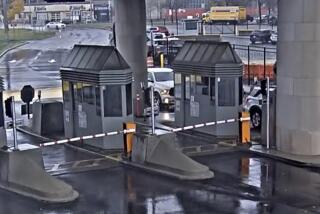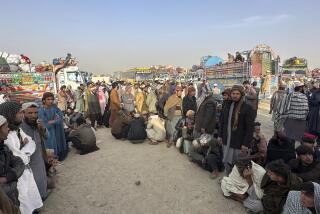Terror probe widens in U.S.
Federal authorities have tied as many as a dozen people to a suspected Al Qaeda-linked bomb plot on U.S. soil as they continue to gather evidence to indict on terrorism charges the young Afghan immigrant at the center of the case, law enforcement officials said Monday.
Authorities said that they did not know the exact number of potential suspects or many of their identities, but that they had been connected through electronic intercepts, surveillance, seized evidence and interviews.
A federal law enforcement official and others, speaking on condition of anonymity because of the high level of secrecy surrounding the investigation, said the suspects appeared concentrated in the New York area, with possibly others in the suspect’s home state of Colorado and elsewhere.
Of particular interest are several individuals that Najibullah Zazi, 24, had met or communicated with on a trip to New York two weeks ago.
In interviews and court filings, federal law enforcement officials said they feared that Zazi was meeting in New York with co-conspirators in a possible plot to bomb subway stations or other crowded civilian targets.
The disclosures came as Zazi, of Aurora, Colo., and two other men arrested Saturday night made their first court appearances Monday on charges of making false statements to federal authorities.
Zazi, his father Mohammed Wali Zazi, 53, and Ahmad Wais Afzali, 37, of Queens, N.Y., were held in custody on orders by judges in Colorado and New York.
Several of the officials said it was likely that Najibullah Zazi will be charged with providing material support to a known terrorist organization based on his admission that he trained in weapons and explosives at an Al Qaeda camp in Pakistan last year. That admission was cited in an FBI affidavit unsealed over the weekend.
The affidavit also alleges that authorities found images on Najibullah Zazi’s laptop of nine pages of notes on making explosives and fuses, apparently in his own handwriting. In addition, the affidavit alleges that authorities have found other information linking Zazi to the suspected plot, including his fingerprints on a small electronic scale and double-A batteries, which are often used in making bombs.
One federal law enforcement official said more serious charges were being considered for Zazi as leverage to get him to cooperate in the investigation and provide information on others who may be involved.
Zazi, who had been monitored by authorities for some time after returning from a trip to Pakistan, was stopped on a New York bridge on Sept. 10 after driving from Colorado on what he said was a trip to settle a business deal that had gone sour.
New York police checked his car and allowed him to leave, according to court documents. Soon after, police showed pictures of Zazi and several others to Afzali, the imam of a Queens mosque who had worked as a police informant in the past.
Zazi and his father later talked by phone with Afzali, who told them of his contact with New York City police detectives.
Zazi flew back to Colorado and agreed to be questioned by FBI agents, who interviewed him for three days. Zazi abruptly stopped cooperating with authorities on Saturday, prompting his arrest.
The false statement charges against the three men result from their conversations with authorities about what they knew about the alleged plot or had told one another about the investigation.
In announcing the charges on Sunday, Assistant Atty. Gen. David Kris emphasized that authorities had “no specific information regarding the timing, location or target of any planned attack.”
The three Afghan-born men, all legal residents of the U.S., have maintained their innocence. They face up to eight years in prison if convicted on the false statement charges.
Zazi and his father, both shuttle drivers at Denver International Airport, were handcuffed for their court appearances Monday afternoon, wearing the same casual street clothes in which they were arrested.
Zazi told Judge Craig Shaffer he didn’t wish to exercise his right to have diplomatic officials from his home country intervene but might do so in the future. It wasn’t clear whether those officials would be from Afghanistan, where he was born, or Pakistan, where he lived as a child.
Zazi will remain in federal custody at least until Thursday, when a detention and preliminary hearing is scheduled.
His father, who was given a public defender, also will remain in custody until arrangements are made for electronic monitoring in his Aurora apartment.
Afzali also appeared in court Monday, neither handcuffed nor shackled. Clad in traditional Islamic garb, he spoke only to briefly answer a magistrate’s questions on whether he understood the charges against him. He blew kisses to relatives, and they waved back.
Outside the court, defense attorney Ronald Kuby portrayed Afzali as a scapegoat in a “bootstrap case created by the government to cover up their own failings.”
Kuby said federal agents had failed to hide their surveillance of Zazi, allowing the case to become public and prompting the searches of apartments in Queens early last week.
He said authorities needed someone to blame and charged Afzali with tipping Zazi off to investigators’ interest in him and some other men.
The charges against Afzali allege that during his phone conversation with Zazi, he warned that authorities had been asking about him and some of his acquaintances. In the same conversation, Afzali noted that the phone call was being monitored, according to the FBI affidavit.
Six days later, the FBI alleges that Afzali denied telling Zazi about his conversations with investigators.
Kuby said it made no sense that Afzali would have lied about a phone conversation that he already had acknowledged was being monitored.
“Why on earth is the imam going to lie to the FBI about the contents of a conversation that he knows they recorded?” Kuby said.
--
tina.susman@latimes.com
Deedee Correll in Denver contributed to this report.
More to Read
Start your day right
Sign up for Essential California for news, features and recommendations from the L.A. Times and beyond in your inbox six days a week.
You may occasionally receive promotional content from the Los Angeles Times.







